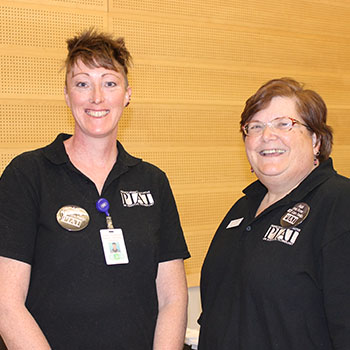
PIAT Services through CLASS connect individuals with the assistive technologies they need to lead more independent lives.
In October of 2015, CLASS was awarded a grant from the Institute on Disabilities at Temple University to offer services under the Pennsylvania’s Initiative on Assistive Technology (PIAT). The mission of PIAT, a program of the Institute on Disabilities at Temple University, Pennsylvania’s University Center for Excellence in Developmental Disabilities (UCEDD), is to enrich the lives of individuals with disabilities, older Pennsylvanians, and their families, by helping them acquire and access assistive technology devices and services.
CLASS held an open house on November 24, 2015 to showcase some of the equipment available through PIAT and allow consumers to learn more about services offered. Christina Chamberlain, RESNA ATP, was also there to provide her expertise in the use of assistive technology. Christina serves as the Assistive Technology Resource Coordinator for the program at CLASS. CLASS serves as the liaison for PIAT in Allegheny, Armstrong, Beaver, Butler, Indiana, Lawrence, and Westmoreland counties, and offers the following services:
- Device Demonstrations - Allows individuals to explore and learn about different assistive technology devices
- Lending Library - Short-term equipment loans for individuals to evaluate at home or in the community
- Reused and Exchanged Equipment Partnership (REEP) - Classifieds to buy, sell, or donate previously owned assistive technology devices and equipment
- Telecommunication Device Distribution Program (TDDP) - Provides free, specialized telephone equipment for individuals who may have difficulties using a regular telephone
The PIAT Services through CLASS connect individuals with the assistive technologies they need in order to lead more independent lives. Elsie Halpern had received equipment several years ago from the TDDP and was familiar with the program. Since then, her vision and hearing problems have worsened, and the equipment she originally obtained was no longer meeting her needs. Elsie contacted Christina to inquire about her eligibility for receiving new equipment from the TDDP. Elsie was apprehensive about living on her own without any way of hearing the phone ring or being able to hear people on the phone when she contacted them.
Christina worked with Elsie to acquire a new CapTel 840 captioned phone from the TDDP. The CapTel 840 captions what people are saying on the screen of the phone for the individual to read, and features an answering machine that captions messages left when a person is unable to answer the phone. Individuals can also adjust the volume of the ringtone and a picture of a phone appears on the screen when a call is received. After Elsie had the phone for a few weeks, Christina called her to ask how the new device was working for her. “You made a 93-year old woman’s heart so happy! I can finally hear on the phone again!” Without her new phone, Elsie may not have felt secure enough in her own home and may not have been able to continue to live independently in her community.
Through the services offered through PIAT, CLASS aims to help individuals, whose stories are similar to Elsie’s, acquire the assistive technology they need in order to remain as independent as possible in their own homes and communities.
